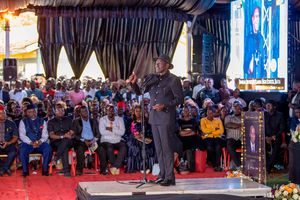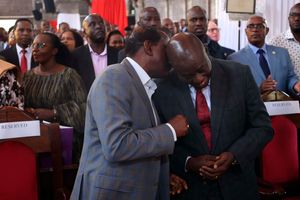
President William Ruto (center). From left: Cabinet Secretaries John Mbadi (Treasury), Aden Duale (Health), Kipchumba Murkomen (Interior) and Alice Wahome (Lands).
President William Ruto’s 2027 re-election bid is taking shape in earnest, with his Cabinet Secretaries increasingly taking up political roles in their development tours and engagements across the country.
The government officials, tasked with implementing policy, are now emerging as vocal defenders of President Ruto’s administration, and aggressive mobilisers on the ground.
Across the country, CSs are doubling up as political messengers, echoing the president’s achievements and pledging continued transformation.
The president’s path to re-election in 2027 is fraught with significant challenges, both from within his administration and the broader political spectrum.
From strained alliances and internal fractures, economic discontent and youth unrest, opposition resurgence, governance challenges and uncertain new partnerships, President Ruto appears not to be sitting pretty in his quest for a second term.
This made him not to leave anything to chance and has been engaging regional leaders including CSs and other government officials ahead of his visits to various regions.
Before he began his recent Mt Kenya tour, Dr Ruto held several meetings with top government officials from the region including Deputy President Prof Kithure Kindiki, CSs, PSs and other leaders for planning.
Even though political analysts still believe the Head of State has enough time to re-invent himself and position his camp for victory, they say he has a lot of work to do to win public confidence.
This has prompted the CSs, to take an active role in marketing the president and his development agenda even as they launch others to pacify the ground.
Public rallies, town hall meetings, and “development inspections” are now being used to sell the Kenya Kwanza narrative while subtly discrediting opposition leaders.
Prime Cabinet Secretary Musalia Mudavadi who is also the Foreign and Diaspora Affairs CS, Kipchumba Murkomen (Interior), Hassan Joho (Blue Economy), Aden Duale (Health), Alice Wahome (Lands), John Mbadi (Treasury), Opiyo Wandayi (Energy), William Kabogo (ICT) are some of the notable ministers who have stepped up Dr Ruto’s 2027 campaign bid.
Prof Kindiki early this month celebrated the successful Mt Kenya tour undertaken by President Ruto, and the by-election in Mbeere North, to replace new Public Service CS George Ruku, is expected to provide an even bigger opportunity to flex his political muscles.
Using thought leaders meeting in his Karen office and Tharaka Nithi home, Prof Kindiki has taken the political message to the populous region, with the message that President Ruto was keen on development of the region, and that their interests were taken care of in the government.
To demonstrate his commitment to the Ruto re-election course, Mr Mudavadi even agreed to merge his Amani National Congress (ANC) party with United Democratic Alliance (UDA) led by the president to enhance solid support especially in former ANC strongholds.
He has termed the merger as “a bold step towards strengthening Kenya Kwanza’s governance agenda.”
His office last week issues a statement explaining that with the merger, Kenya Kwanza remains focused on delivering on its electoral promises while maintaining political stability ahead of the 2027 elections.
Mr Murkomen has also in the past weeks stepped up his campaigns for Dr Ruto’s re-election in various forums in Nairobi and during the recent burial of former minister John Koech.
He exuded confidence that President Ruto will be re-elected contrary to belief he is unpopular.
The CS likened the current political and economic situation to that of 2005 after President Mwai Kibaki lost the referendum and dissolved his Cabinet.
In rallying for the broad-based government, which saw Opposition leader Raila Odinga’s allies join Cabinet after its dissolution last year in the aftermath of the Gen Z protest, Mr Murkomen said it’s the best route to stabilise the country.
To him, the late Kibaki clinched his second term in 2007 under Party of National Unity (PNU) umbrella at a time people thought he had lost support of the electorate.
“After the 2005 referendum happened, few wanted to serve in that cabinet. At that point in time, it looked like Kibaki was completely finished after he had bundled ODM, LDP then, out of government,” the CS recounted.
He said what President Kibaki formed is akin to the broad-based government, which is the best decision to unite the country.
In the aftermath of the 2005 referendum loss, that saw Kibaki dissolve his cabinet, he said he needed a broad-based government at that time.
“What President Ruto did was not new. The challenges he is facing are not new. In 2005 Kibaki was the most unpopular person that everybody was saying uchumi ni ya watu wachache (economy belongs to a few people), but he is the most celebrated president today,” Mr Murkomen said.
He expressed optimism that the President will be re-elected and will be the most transformative president.
“The challenges we went through last yet and future of this country is in safe hands,” said the CS.
He told off those doubting President Ruto’s re-election chances.
“I believe when the time comes, this government will have delivered much better than the predecessors because of the foresight and your leadership that brings people together,” he told president Ruto in Bomet.
The strategic deployment of CSs to campaign for him is not however, accidental.
Insiders say the president is keen on avoiding the fallout seen in his first term with former President Uhuru Kenyatta, where a disconnect between the executive and the grassroots proved politically costly.
By involving his top appointees early, Dr Ruto aims to consolidate his base and push back against criticism from within the Mt Kenya region and other key battlegrounds.
President Ruto is on record accusing his former deputy Rigathi Gachagua of failure to profile his government projects.
"When I was deputy president, I went for TV interviews more than president Uhuru Kenyatta. When serving as deputy president, it's your duty to profile government projects, did you see Rigathi on any TV station talking about government programmes? No," president Ruto said during an interview at Sagana State Lodge.
Read:
During the swearing in of his deputy Prof Kithure Kindiki last year, the Head of State noted said he had remained a “lonely voice,” at the presidency, noting that in Prof Kindiki he had gotten a “dedicated deputy,” who would help him project his government’s policies.
Mr Joho has criticized those attacking Kenya Kwanza administration on social media, saying that; “let them talk in the social media but for us we are on the ground.”
Ms Wahome revealed attempts by Mr Gachagua’s camp to pull her out of the government.
“We hunted for votes for the presidency and we won and formed the government. Every plan the president has cannot succeed if we are not in government. Even if they try to pull me out of government, I will not heed to their calls because Prof Kindiki is also our son and we are together in this government,” Ms Wahome said.
Mr Mbadi and Mr Wandayi has also on many occasions defended president Ruto, and vowed to campaign for his re-election.
Their defense for the presidency has even earned them a tag as “praise singers.”
Siaya Governor James Orengo has warned against such a move, insisting that leaders under the broad based must remain vigilant and not to amplify government’s excesses.
Read: Orengo defies Raila
"…so I urge you, praise singing will not get us anywhere, I urge you to tell your leader the truth. I don't sing praises. This country will go to the dogs again if the kind of language I'm hearing here continues. If anything is brought to Siaya, it will be as a matter of right, not as a favour," Mr Orengo said in the presence of resident Ruto and Mr Odinga at a funeral in Siaya last Saturday.
Other critics argue that the move by CSs to launch Dr Ruto’s re-election campaigns blurs the lines between state functions and political campaigns, with taxpayer-funded trips being used to push party agendas.
The opposition has raised alarm, accusing the CSs of abandoning their core mandates in favor of politicking and undermining the spirit of public service neutrality.
Nonetheless, the political machinery is in motion.
With grassroots engagement becoming the new currency of political survival, Dr Ruto’s team seems to have learned from past mistakes and is banking on visibility, connection, and message control to set the stage for a smoother 2027 campaign.











